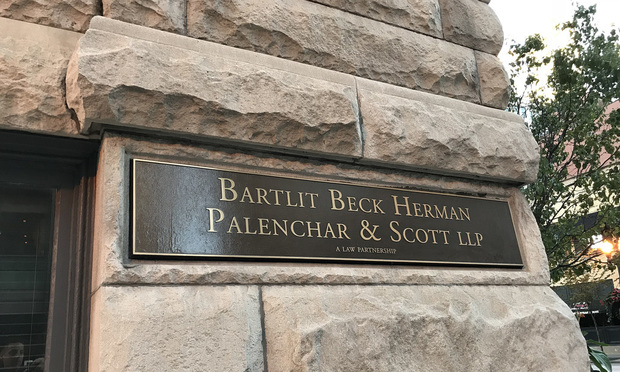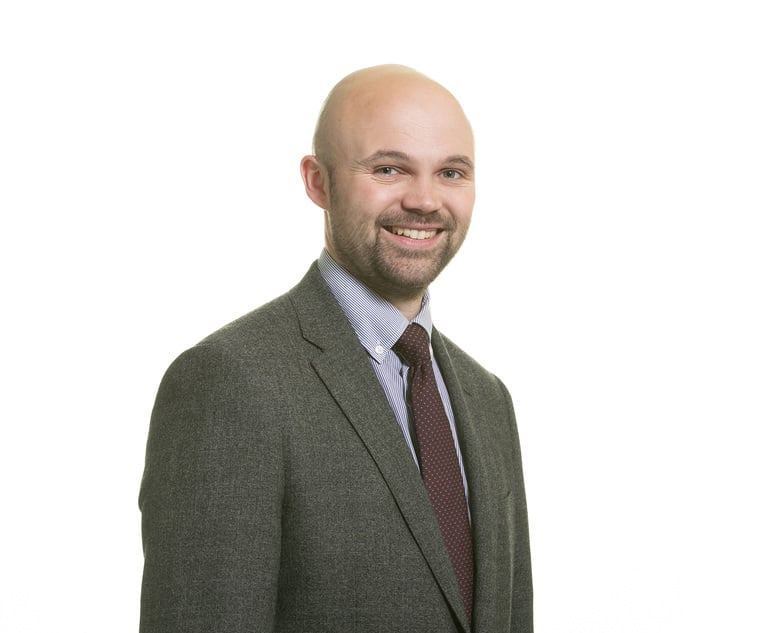25 Years In, Litigation Boutique Bartlit Beck Has New Leadership
Jason Peltz, who has spent most of his career as a litigator with Bartlit Beck, has become the firm's new managing partner. Longtime firm leader and former managing partner Skip Herman has assumed the role of chairman.
February 21, 2018 at 05:30 PM
6 minute read

Litigation-focused law firm Bartlit Beck Herman Palenchar & Scott has made its first leadership transition since the firm's founding 25 years ago.
The firm has elevated Jason Peltz to managing partner, while former longtime managing partner Sidney “Skip” Herman remains at the firm in the role of chairman. The leadership changes quietly took effect at the beginning of the year.
In an interview with The American Lawyer, Herman said he has spent the past few years preparing for, and incrementally carrying out, a transition plan that he hopes will put the firm on a successful run into the future. He also said Peltz, an active litigator who has spent 22 years—almost his entire legal career—at Bartlit Beck, long served as a second-in-command and made for a natural fit as the firm's next managing partner.
“After 25 years, any organization, particularly when you're trying to institutionalize it … needs new blood and new leadership,” Herman said. “I'm stepping out of the day-to-day, and doing a little more of the long-range planning and financial planning.”
As firm chairman, Herman said he will continue to oversee the firm's finances and lawyer compensation, at least in the short-run. He had held the managing partner role throughout the full history of Bartlit Beck, which began in 1993 when prominent litigator Fred Bartlit Jr. led a group of lawyers in breaking off from Kirkland & Ellis, adopting a business model that eschewed the traditional billable hour.
Bartlit's prominence helped establish the firm early on, but it wasn't long before it became known for multiple top-flight trial lawyers, including co-founder Philip Beck, who headed former President George W. Bush's trial team In Bush v. Gore in the Florida recount litigation that ultimately determined the 2000 presidential election.
In the years that followed, Bartlit Beck remained committed to the core principles that guided its early days, including a staffing approach that consists of small teams mostly made up of partners, an aversion to lateral hiring, and a billing model based on flat fees, according to the firm's leaders. Those attributes have set the firm apart, said Peltz, who added that as Bartlit Beck's new managing partner, he does not see them changing anytime soon.
“As I look around at our exceptional partners, with experienced teams, and I look at … the top-notch nature of the associates, I'm excited. I come to work, as almost all of our partners do, excited,” Peltz said. “We're working on small teams, … we're all digging in on it together and it's an exciting opportunity to do something that we know works, and that we look forward to doing.”
Bartlit Beck has also placed a premium on developing talent from within, hiring a small number of highly credentialed associates each year, and giving younger lawyers meaningful trial experience, according to firm leaders. For example, when the firm announced its newly elected partners in January, it noted that the five of them—four of whom are women—collectively have more than 130 days of trial experience.
The firm's approach differs drastically from most large law firms, which tend to have many more associates than partners. Bartlit Beck, in contrast, has 63 litigation partners and just 12 associates.
“If you only hire two or three or four people a year with the expectation that they're going to be with you their whole careers, then you approach their training and mentoring much differently than if you have a bunch of people,” said firm co-founder Beck. “We've actually institutionalized the ethic that giving opportunities and responsibility to younger lawyers is the highest achievement that you can attain at the firm.”
Even with younger lawyers playing substantive roles, Bartlit Beck has managed to rack up big litigation wins and maintain long-term client relationships, including its representation of United Technologies Corp. and its jet engine unit, Pratt & Whitney, in several high-stakes cases over the years.
“Over the last, say, 20 years, they've always handled our biggest litigation matters,” said Steven Greenspan, chief litigation counsel at United Technologies. He noted that the firm in 1996 successfully defended Pratt & Whitney in a four-month antitrust trial, securing a jury verdict that cleared the company of hundreds of millions of dollars in damages claims. More recently, in 2011, Bartlit Beck helped United Technologies prevail in a patent dispute with Rolls-Royce, and Greenspan said he has again turned to the firm to help his company navigate pending environmental litigation in Florida.
Reflecting back over the firm's first 25 years, Beck said the sustained, positive track record of developing skilled trial lawyers, is something he might not have expected back in 1993.
“The firm's success has exceeded my expectations, and I had very high expectations,” Beck said. “I thought we would do well in court, and we did, but what I didn't really anticipate is that we would have the success that we've had in developing the next generation of lawyers … that are as well-credentialed as they are.”
Beck also credited Herman's stewardship of the firm in the managing partner role as key, adding that he has nothing but confidence in Peltz to continue on a similar path.
“He has done a great job of managing the firm so that we've maintained our focus on quality while still doing it in a way that we've been profitable and economically successful,” Beck said of Herman. “I think Jason's going to do an equally excellent job. I think it's going to be very, very seamless; he's committed to the same principles.”
Peltz stressed that his goal as managing partner is to continue to hold true to the firm's principles, “doubling down” on Bartlit Beck's approach.
“That, in particular, is a focus on hiring and retaining the best people, training them and really putting forth experienced teams that provide us the greatest opportunity for success in winning for our clients,” Peltz said. “We're anticipating this transition being not only smooth, but beyond smooth.”
This content has been archived. It is available through our partners, LexisNexis® and Bloomberg Law.
To view this content, please continue to their sites.
Not a Lexis Subscriber?
Subscribe Now
Not a Bloomberg Law Subscriber?
Subscribe Now
NOT FOR REPRINT
© 2025 ALM Global, LLC, All Rights Reserved. Request academic re-use from www.copyright.com. All other uses, submit a request to [email protected]. For more information visit Asset & Logo Licensing.
You Might Like
View All
Government Attorneys Face Reassignment, Rescinded Job Offers in First Days of Trump Administration
4 minute read


Trending Stories
Who Got The Work
J. Brugh Lower of Gibbons has entered an appearance for industrial equipment supplier Devco Corporation in a pending trademark infringement lawsuit. The suit, accusing the defendant of selling knock-off Graco products, was filed Dec. 18 in New Jersey District Court by Rivkin Radler on behalf of Graco Inc. and Graco Minnesota. The case, assigned to U.S. District Judge Zahid N. Quraishi, is 3:24-cv-11294, Graco Inc. et al v. Devco Corporation.
Who Got The Work
Rebecca Maller-Stein and Kent A. Yalowitz of Arnold & Porter Kaye Scholer have entered their appearances for Hanaco Venture Capital and its executives, Lior Prosor and David Frankel, in a pending securities lawsuit. The action, filed on Dec. 24 in New York Southern District Court by Zell, Aron & Co. on behalf of Goldeneye Advisors, accuses the defendants of negligently and fraudulently managing the plaintiff's $1 million investment. The case, assigned to U.S. District Judge Vernon S. Broderick, is 1:24-cv-09918, Goldeneye Advisors, LLC v. Hanaco Venture Capital, Ltd. et al.
Who Got The Work
Attorneys from A&O Shearman has stepped in as defense counsel for Toronto-Dominion Bank and other defendants in a pending securities class action. The suit, filed Dec. 11 in New York Southern District Court by Bleichmar Fonti & Auld, accuses the defendants of concealing the bank's 'pervasive' deficiencies in regards to its compliance with the Bank Secrecy Act and the quality of its anti-money laundering controls. The case, assigned to U.S. District Judge Arun Subramanian, is 1:24-cv-09445, Gonzalez v. The Toronto-Dominion Bank et al.
Who Got The Work
Crown Castle International, a Pennsylvania company providing shared communications infrastructure, has turned to Luke D. Wolf of Gordon Rees Scully Mansukhani to fend off a pending breach-of-contract lawsuit. The court action, filed Nov. 25 in Michigan Eastern District Court by Hooper Hathaway PC on behalf of The Town Residences LLC, accuses Crown Castle of failing to transfer approximately $30,000 in utility payments from T-Mobile in breach of a roof-top lease and assignment agreement. The case, assigned to U.S. District Judge Susan K. Declercq, is 2:24-cv-13131, The Town Residences LLC v. T-Mobile US, Inc. et al.
Who Got The Work
Wilfred P. Coronato and Daniel M. Schwartz of McCarter & English have stepped in as defense counsel to Electrolux Home Products Inc. in a pending product liability lawsuit. The court action, filed Nov. 26 in New York Eastern District Court by Poulos Lopiccolo PC and Nagel Rice LLP on behalf of David Stern, alleges that the defendant's refrigerators’ drawers and shelving repeatedly break and fall apart within months after purchase. The case, assigned to U.S. District Judge Joan M. Azrack, is 2:24-cv-08204, Stern v. Electrolux Home Products, Inc.
Featured Firms
Law Offices of Gary Martin Hays & Associates, P.C.
(470) 294-1674
Law Offices of Mark E. Salomone
(857) 444-6468
Smith & Hassler
(713) 739-1250










